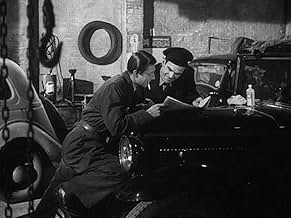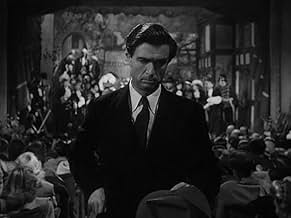On the south west coast of England, two crusading reporters revive a failing newspaper and expose local corruption.On the south west coast of England, two crusading reporters revive a failing newspaper and expose local corruption.On the south west coast of England, two crusading reporters revive a failing newspaper and expose local corruption.
Patric Doonan
- Burton
- (as Patrick Doonan)
Andy Alston
- Police Constable at Court
- (uncredited)
Stanley Baker
- Barnes
- (uncredited)
Storyline
Did you know
- TriviaFollowing the opening credits there is a travel poster based on the famous ones issued by the rail companies, which reads: TORMOUTH for SUNNY HOLIDAYS GET THERE FASTER ON BRITISH RAILWAYS
- SoundtracksLibretto for the Operetta 'The Prodigal Princess'
Music by Temple Abady (uncredited)
by Stafford Byrne
Produced by Desmond Davis (as Desmond Davies)
Featured review
First the good news: lovely photography of Lime Regis in summer. But the bad news is that a number of things let this film down. Firstly the lead - Norman Moreland, a tall handsome classical actor but without star quality or personality. Secondly a lack of wit and sensitivity in the screenplay. Thirdly a rather unsympathetic plot.
I'm not sure if the resemblance was coincidental but Moreland physically and in the clothing closely resembles actor James Stewart and the film and part resemble - but fall far short of - a number of classic James Stewart comedies. The difference is that Stewart's screen persona was perfectly served by the scripts: the audience's sympathies and emotions perfectly manipulated. Here the screenplay is, like the main characters, rather clumsy and not really sympathetic. The female lead (Sarah Churchill) too was all set to marry Moreland but angrily rejects him when she discovers that marriage will not provide her an escape to London. Ealing comedies would never have been so clumsy with characters. Even the "villains" (Fabia Drake and James Hayter - always exceedingly good) in this film had more personality and in a way more engaging and certainly more entertaining than the two do-gooders who while they blast open the small town cronyism and corruption, are in their way intolerant overbearing know-alls. It perhaps though accurately reflected the times with division between those who spent the war at home unchanging provincial narrowness and those whom the war was transformative - seeing the world, seeing and having responsibility for decisions over life and death. The screenplay needed to have sketched this rather than assume the audience necessarily knew and were sympathetic.
Some reviews of the time were uncommonly uncomplimentary: "The New York Times described it as a "slow, dogmatic little picture" with a "dog-eared" plot. In The Times, the film's plot was seen as unoriginal, executed "without inspiration or any originality of thought" (Wikipedia) The criticism of the plot seems though unduly harsh - a film about the (local) press being in bed with advertisers and business interests the local people overturning it is not a common one.
A 6.5 - it could have been an 8. Moreland as an actor performed the script he was given but added nothing. A star such as Kenneth More would most likely have seen a need for changes to it. It's what made "Genevieve" such a classic - More played a loud selfish and insensitive man often maddening his wife - but with periodic self-awareness and redeeming charm - script and actor in perfect harmony.
I'm not sure if the resemblance was coincidental but Moreland physically and in the clothing closely resembles actor James Stewart and the film and part resemble - but fall far short of - a number of classic James Stewart comedies. The difference is that Stewart's screen persona was perfectly served by the scripts: the audience's sympathies and emotions perfectly manipulated. Here the screenplay is, like the main characters, rather clumsy and not really sympathetic. The female lead (Sarah Churchill) too was all set to marry Moreland but angrily rejects him when she discovers that marriage will not provide her an escape to London. Ealing comedies would never have been so clumsy with characters. Even the "villains" (Fabia Drake and James Hayter - always exceedingly good) in this film had more personality and in a way more engaging and certainly more entertaining than the two do-gooders who while they blast open the small town cronyism and corruption, are in their way intolerant overbearing know-alls. It perhaps though accurately reflected the times with division between those who spent the war at home unchanging provincial narrowness and those whom the war was transformative - seeing the world, seeing and having responsibility for decisions over life and death. The screenplay needed to have sketched this rather than assume the audience necessarily knew and were sympathetic.
Some reviews of the time were uncommonly uncomplimentary: "The New York Times described it as a "slow, dogmatic little picture" with a "dog-eared" plot. In The Times, the film's plot was seen as unoriginal, executed "without inspiration or any originality of thought" (Wikipedia) The criticism of the plot seems though unduly harsh - a film about the (local) press being in bed with advertisers and business interests the local people overturning it is not a common one.
A 6.5 - it could have been an 8. Moreland as an actor performed the script he was given but added nothing. A star such as Kenneth More would most likely have seen a need for changes to it. It's what made "Genevieve" such a classic - More played a loud selfish and insensitive man often maddening his wife - but with periodic self-awareness and redeeming charm - script and actor in perfect harmony.
- trimmerb1234
- Feb 1, 2017
- Permalink
Details
- Runtime1 hour 23 minutes
- Color
- Aspect ratio
- 1.37 : 1
Contribute to this page
Suggest an edit or add missing content

























